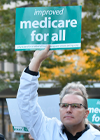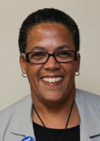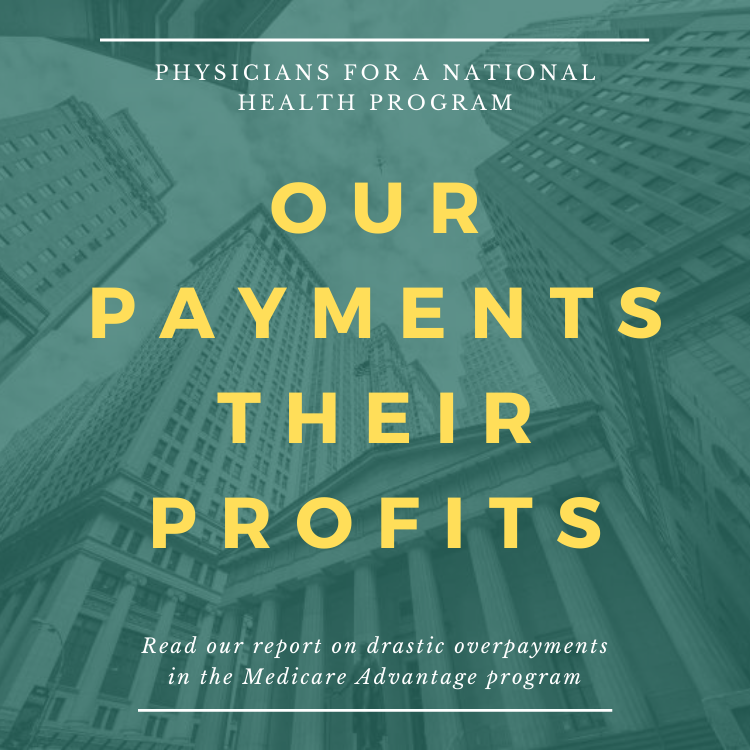PNHP’s 2007 Leadership Training will be held Friday-Saturday, November 2-3, 2007 in Washington D.C. Further details TBA. For those interested in the meeting’s content, reprinted below is the agenda from PNHP’s 2006 Leadership Training.
To view the 2006 Leadership Training Agenda click here To view the leadership training flyer and registration form, click here For directions to the Santa Monica Doubletree and Friday night’s reception, click here (pdf file) PNHP Leadership Training, Spring 2006 Who: The faculty are all longtime activists and members of the Board of Directors of Physicians for a National Health Program or PNHP’s California chapter, the California Physicians’ Alliance (CaPA). All of the participants are members of PNHP who have a sincere desire to become more effective activists in the health care debate. Most are physicians; a select few non-physician allied health professionals and students will also participate. What: A crash course in becoming an expert on single payer and a leader in the movement for comprehensive health care reform. Small group and plenary sessions with nationally known researchers, speakers, and leaders who are shaping the terms of the debate and are effective activists in their communities. Opportunity for extensive personal attention. Prior to the training, participants will receive a National Health Program Reader to start reviewing the material on their own. The training will start with an evening reception on Friday, April 28 (from 6:30 p.m. to 9:00), followed by an intensive day of lectures and workshops on Saturday, April 29 starting at 9:00 a.m. A dinner with plenary speaker will conclude Saturday’s program. There is an optional breakfast meeting on Sunday, April 30. When: Friday, April 28, evening reception 6:30 to 9:00 p.m., Saturday, April 29, doors open at 8:00 a.m. for coffee/bagels Program from 9:00 a.m. to 5 p.m. Dinner from 6:00 p.m. to 9:00 p.m. (note change in time) Sunday, April 30 breakfast discussion, 9 a.m. to noon Where: Doubletree Guest Suites, 1-800-222-8733 1707 Fourth Street Santa Monica, California $189 single/double (we can help find you a roommate to share expenses if you drop us a note). RSVP/Fees: $150 for physicians including training, all meals and materials $50 for additional dinner guests (spouses invited) 50 percent discount for medical students. Print out the registration form at www.pnhp.org and fax it in or call Matt Petty at 312-782-6006 or via e-mail at matt@pnhp.org. Register ASAP as spaces fill quickly. Questions? Call Nick Skala at 312-782-6006! _______________________________________ Objectives: At the end of this course participants will be able to 1) Use the PNHP slide show in a Grand Rounds or other medical conference with confidence. 2) Answer the “tough questions” on reform: what about rationing, government bureaucracy, and technology? – using the latest medical and health services research. 3) Describe how other countries provide universal coverage and why single-payer is the best option for reform based on decades of international experience and the unique features of the US health system. 4) Write an effective op-ed or other mass media article for publication. 5) Identify strategies to advance the health care debate in your community using available resources. 6) Overcome inertia and find your “niche” in the health care debate – ;the place to use your interests and talents most effectively. 7) Identify experts on various aspects of reform (quality, pharmaceuticals, costs, etc) who are resources to the movement. 8) Describe the powerful groups leading opposition to reform and the relationship between congress, the insurance and drug companies, and the government-industry revolving door. 9) Place the current push for reform – and opposition to it – in historical context since 1904. 10) Respond to the Myths about reform with the Facts 11) Start (or re-vitalize) a chapter of PNHP. 12) Work effectively with grassroots advocates for reform. And much, much more! Spend an enjoyable weekend with other physicians who share your values. Note: All participants are required to submit a CV or bio and photograph (head shot only) for us to keep on file for our speakers’ bureau. Please send these separately to Nick Skala at PNHP, 29 E. Madison, Suite 1412, Chicago, IL 60602. nick@pnhp.org. —————————————————————————————
AGENDA (minor changes may occur in workshops/speakers)
Friday, April 28 Pre- 6:00 p.m. check-in hotel 6:30 to 9:00 p.m. Reception with Dr. Bree Johnston, Chair CAPA and Sen. Sheila Keuhl, lead sponsor SB 840 (invited), location TBA Saturday, April 29 8:00 a.m. Registration, coffee and bagels. 9:00 a.m. Introductions and goals for the training Dr. Quentin Young, PNHP Volunteer National Coordinator 9:30 a.m. The failure of corporate health care and the single payer alternative Dr. Steffie Woolhandler, Associate Professor, Harvard Medical School, PNHP Co-founder Presentation using PNHP slides – 45 minutes Q and A with participants – 45 minutes 11:00 a.m. break 11:15 a.m. Workshops I choose one (to be repeated) (All workshops start with roundtable introductions to facilitate networking and feature extensive opportunity for questions and discussion with PNHP Board members). Managed Care 2.0: Pay for Performance, Disease Management, and Report Cards Kip Sullivan, JD Debating the far-right and other adventures in health policy Dr. Don McCanne, PNHP Senior Health Policy Fellow, author Quote of the Day What do single payer advocates have to say about skyrocketing drug prices and malpractice premiums? Dr. Gordon Schiff, PNHP former President Myths and Realities about the Canadian Health System Dr. Claudia Fegan, PNHP former President 12: 30 p.m. Buffet lunch Medicare Drug Bill and HR 676 – Dr. Quentin Young short history of the movement for US health reform Dr. Oliver Fein, Chair, NYC Metro chapter 2:00 Workshops (repeated) 3:15 Organizing medical students and physicians at the state level California group – Dr. Richard Quint Non-California group – Dr. Wink Dilloway, Chair, NJ chapter PNHP 4:00 Mock Debates – moderators, Drs. Oliver Fein and Wink Dillaway 6:00 – end (note: was previously scheduled for 7:00 p.m.) Dinner Program Host: Dr. Quentin Young National Health Insurance: How Can we Afford It – Dr. Jim Kahn, Board, CaPA Sunday breakfast (optional) 9 a.m. to noon Finding your niche in activism PNHP Executive Director, Dr. Ida Hellander CAPA leaders, TBA ———————————————————————————– REGISTRATION FORM PNHP Spring Leadership Training Institute Saturday, April 29, 2006 Doubletree Guest Suites, Santa Monica, CA Fax to 312-782-6007 Name(s)___________________________________________________________ Mailing Address where you can receive a package of materials in advance: __________________________________________________________________ __________________________________________________________________ City, State, Zip:__________________________________ E-mail_______________________ Daytime phone_______________________ Program Fee: Physicians: $150, includes all materials and meals Students: $75 Additional dinner guest ($50) Form of Payment: ___ Check ___ VISA ___ MasterCard Account number: _______ _______ ______ ______ Exp date ______/______ Amount enclosed or to
charge $__________ RSVP to the PNHP National Office at 29 E. Madison St. Suite 1412, Chicago, IL 60602 (312) 782-6006 or by fax to (312) 782-6007 or by email: matt@pnhp.org












